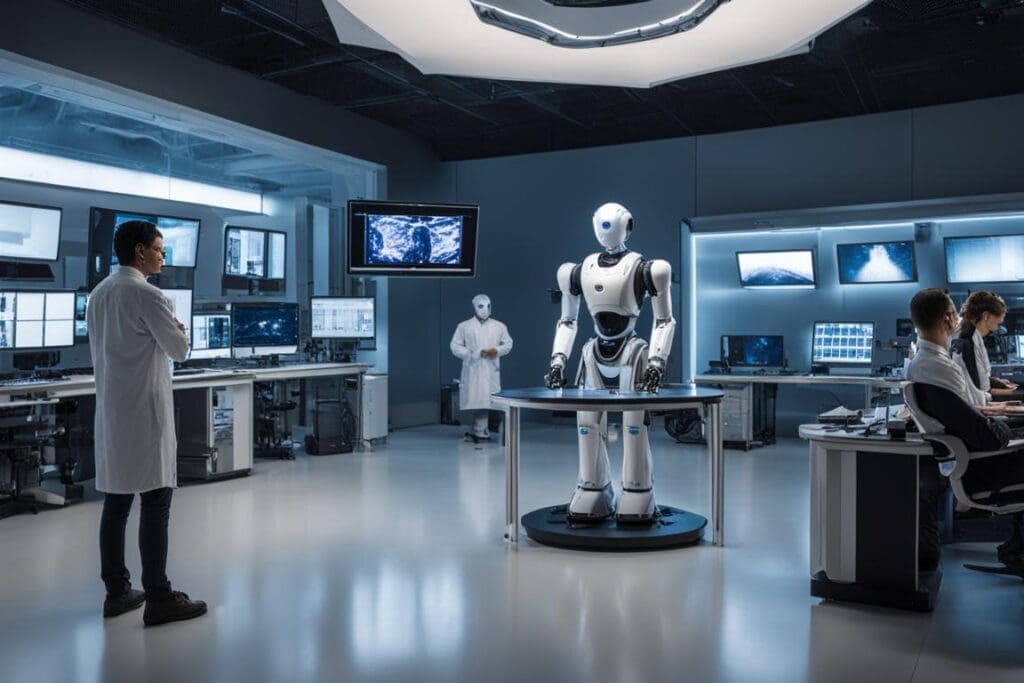Advanced AI Studies have become a crucial field in our rapidly advancing world. With technology evolving at an unprecedented rate, the curiosity about AI’s capabilities and potential impact on society is growing. In this article, we will explore the progress made in AI technology and its applications in the United States.
Key Takeaways:
- AI research and development is driving innovation in the United States.
- Advanced AI projects are shaping the future of technology.
- AI innovation holds great potential for various industries.
- Exploring the ethical considerations of AI is crucial for responsible development.
- The United States is at the forefront of AI advancements.
Hi, A.I (2019): Exploring Emotional Connections between Humans and AI
The documentary Hi, A.I (2019) provides a fascinating insight into the world of AI-powered robots and their impact on human emotions and relationships. Directed by Isa Willinger, the film showcases the stories of two remarkable AI creations: Pepper, a customer service robot, and Harmony, an AI-powered companion. Through their interactions with humans, the documentary raises important questions about the ethical considerations surrounding AI technology.
“What happens when AI starts becoming more like a companion? When you start developing an emotional bond with an AI, it can be a very powerful and positive experience,” says Willinger.
The film delves into the complexities of human-robot relationships and explores the potential benefits and challenges that arise when emotions are involved. It prompts viewers to contemplate the boundaries between human and artificial intelligence and raises important ethical dilemmas.
As AI technology continues to advance, it becomes vital to address the ethical implications of creating machines that mimic human emotions. The documentary provides a thought-provoking platform for discussions on the evolving role of AI in society and the importance of responsible AI development.
Exploring Emotional Connections
In Hi, A.I (2019), viewers witness the emotional impact of AI technology firsthand. It challenges preconceived notions about the capabilities of AI and highlights the potential for these technologies to forge meaningful connections with humans. Through the stories of Pepper and Harmony, the documentary offers a glimpse into a future where emotional bonds between humans and AI-powered robots may become increasingly commonplace.
Do You Trust This Computer? (2018): Examining the Impact and Ethical Considerations of AI
Do You Trust This Computer? (2018) is a thought-provoking documentary that delves into the wide-ranging impact and ethical considerations of artificial intelligence (AI). The film explores various aspects of AI, including its role in healthcare, the ethical implications of autonomous weapons, and concerns about job displacement caused by AI technology.
In the healthcare sector, AI has shown great promise in areas such as medical diagnostics, drug discovery, and patient care. However, the documentary highlights the need for careful consideration of the ethical implications of using AI in healthcare. It raises questions about privacy, data security, and the potential for bias in AI algorithms.
Another area of concern explored in the film is the development and use of autonomous weapons. This raises ethical questions about the responsibility and accountability of AI in making life and death decisions. The documentary emphasizes the need for international collaboration and regulation to address these concerns and prevent the misuse of AI technology in warfare.
“The development of artificial intelligence is full of contradictions, and the power it holds can be both awe-inspiring and terrifying.” – Do You Trust This Computer? (2018)
Additionally, the documentary examines the potential impact of AI on the workforce. While AI has the potential to automate repetitive and mundane tasks, there are concerns about the displacement of jobs and the need for reskilling and upskilling the workforce to adapt to the changing demands of the AI-driven economy.
Overall, Do You Trust This Computer? (2018) serves as a wake-up call, urging society to critically assess the impact of AI technology. It emphasizes the importance of trust in AI systems and advocates for responsible development, ethical considerations, and collaboration to maximize the benefits and minimize the potential risks of AI in our rapidly evolving world.
Lo and Behold, Reveries of the Connected World (2016): Unveiling the Past, Present, and Future of AI
Lo and Behold, Reveries of the Connected World (2016) is a captivating documentary directed by Werner Herzog that takes us on a fascinating journey through the history and impact of artificial intelligence (AI) and the internet. This thought-provoking film explores the profound implications of AI technology on society, shedding light on its past, present, and future.
The documentary delves into the early days of AI and its humble beginnings, tracing its evolution and remarkable advancements over the years. It highlights some of the key milestones in AI history, showcasing breakthroughs in machine learning and the development of intelligent systems that continue to shape our world today.
Moreover, Lo and Behold examines the far-reaching consequences of our interconnected world, emphasizing the internet’s impact on society. It explores the pros and cons of our reliance on the internet, ranging from its ability to connect people globally to issues of privacy, cybersecurity, and the dark side of online interactions.
The Power of AI and the Internet
One of the most compelling aspects of the documentary is its exploration of the immense power held by AI and the internet. It raises important questions about the ethical considerations surrounding AI technology, emphasizing the need for responsible development and the alignment of AI with human values.
Throughout the film, Herzog interviews leading experts and visionary thinkers in the field of AI, providing valuable insights into the potential future of AI technology. As we navigate the possibilities and challenges of AI, Lo and Behold serves as a reminder of the profound impact it has on our lives and the importance of carefully considering its implications.
| AI History | Machine Learning | Internet’s Impact |
|---|---|---|
| Traces the evolution of AI from its early days to the present | Highlights breakthroughs in machine learning and intelligent systems | Explores the pros and cons of our interconnected world |
| Examines key milestones in AI history | Sheds light on the development of AI technologies and algorithms | Raises questions about privacy, cybersecurity, and online interactions |
| Provides insights into the future potential of AI | Explores the power and ethical considerations of AI technology | Emphasizes the need for responsible AI development |
Lo and Behold, Reveries of the Connected World (2016) offers a compelling exploration of the past, present, and future of AI and its profound impact on society. Through captivating storytelling and thought-provoking interviews, this documentary invites viewers to contemplate the possibilities and challenges that lie ahead in our increasingly connected world.
“AI is not going to conquer us. But we have to be careful with the powers we are unleashing.”
AlphaGo (2017): The Journey of an AI Program in Conquering a Complex Game
AlphaGo (2017) is a remarkable documentary that takes us on an incredible journey through the development and triumph of an AI program in the game of Go. Directed by Greg Kohs, the film showcases the power of deep learning techniques and the tremendous potential of AI in the gaming realm. It reveals the emotional impact of witnessing an AI program challenge and defeat a world champion player, Lee Sedol, in a historic five-game match.
The film highlights the significance of AlphaGo’s victory, as it proves that AI can excel at complex strategic games that were once thought to be the exclusive domain of human intelligence. Through intricate algorithms and extensive training, AlphaGo was able to analyze millions of moves and make decisions based on its learned knowledge. This achievement not only revolutionized the field of gaming but also opened up new possibilities for the application of AI in various other domains.
With its deep learning techniques, AlphaGo demonstrated that AI can excel in intuitive decision-making, pattern recognition, and strategic planning. This has implications beyond the world of gaming, as similar algorithms can be applied to solve complex real-world problems. AlphaGo’s journey showcases the potential of AI to provide innovative solutions in industries such as healthcare, finance, and logistics.
Overall, AlphaGo (2017) not only captivates viewers with its thrilling narrative but also provides thought-provoking insights into the capabilities and potential of AI in gaming and beyond. It prompts us to contemplate the role of AI in our society and sparks discussions about the impact of AI technology on various aspects of our lives.
| Highlights of AlphaGo (2017) |
|---|
| Deep learning techniques used by AlphaGo |
| Emotional impact of AI’s performance against a world champion player |
| Implications of AI’s success in gaming for other industries |
| Potential of AI to solve complex real-world problems |
iHuman (2019): Exploring the Implications and Opportunities of AI
iHuman (2019) is an eye-opening documentary that delves deep into the power dynamics within the tech industry and the misalignment of AI with human values. Directed by Tonje Hessen Schei, the film explores the complex relationship between humans and AI, raising thought-provoking questions about the ethical considerations that come with technological innovation.
The documentary highlights how the rapid advancements in AI technology have outpaced society’s ability to fully grasp its implications. It explores the potential consequences of unchecked AI development and the need for a balanced approach that considers the ethical implications of AI alongside innovation. As we push the boundaries of what AI can achieve, it becomes crucial to ensure that these advancements align with our values and aspirations.
A quote from the documentary: “AI is a tool, but we need to discuss what it’s being used for. We need to decide what kind of future we want.”
The film also examines the power dynamics within the tech industry and how they can influence the direction of AI development. It raises important questions about who holds the reins of technological progress and the potential consequences of concentrated power. By shedding light on these issues, iHuman (2019) encourages viewers to think critically about the responsible development and use of AI in the future.
Power Dynamics in the Tech Industry: Balancing Innovation and Ethical Considerations
The iHuman (2019) documentary serves as a reminder that innovation must be accompanied by a diligent examination of its impact on society. It emphasizes the need for a comprehensive approach that balances the potential of AI with the ethical considerations it poses. By engaging in meaningful discussions and establishing clear guidelines, we can shape the future of AI in a way that aligns with our values and aspirations.
| Implications of AI | Opportunities of AI |
|---|---|
| – Potential misalignment with human values | – Capacity for innovation and problem-solving |
| – Power dynamics within the tech industry | – Enhanced efficiency and productivity |
| – Ethical considerations of AI development | – Improved decision-making processes |
| – Need for responsible AI use | – Advancements in healthcare and medicine |
iHuman (2019) serves as a call to action, urging us to engage in ongoing conversations about the implications and opportunities of AI. By exploring the complex relationship between humans and technology, we can strive to create a future where AI is harnessed responsibly and serves the best interests of society.
The Future of AI: Insights from NCSA Director
Artificial Intelligence (AI) has made significant advancements in recent years, revolutionizing various industries and opening doors to new possibilities. To gain insights into the future of AI, I had the opportunity to speak with Bill Gropp, the director of the National Center for Supercomputing Applications (NCSA). NCSA is at the forefront of AI innovation and research, pushing the boundaries of what AI can achieve.
When discussing AI advancements, Gropp highlighted the tremendous progress made in machine learning algorithms and deep learning techniques. These advancements have enabled AI systems to perform complex tasks with greater accuracy and efficiency. However, Gropp also emphasized the limitations of current AI systems, particularly in terms of their generalizability and ethical considerations.
While AI has showcased impressive capabilities in areas such as image recognition, natural language processing, and autonomous vehicles, there are still challenges to overcome. Gropp emphasized the need for continued research in AI to address these limitations and ensure the responsible development of AI technology. By investing in research, we can strive for more robust AI systems that are capable of understanding context, reasoning, and making ethical decisions.
To illustrate the need for ongoing research, Gropp highlighted the importance of AI systems aligning with human values. As AI becomes increasingly integrated into our daily lives, it is crucial to ensure that AI systems prioritize ethical considerations and respect human rights. By conducting research, we can work towards developing AI systems that are transparent, accountable, and trustworthy.
Furthermore, Gropp emphasized the role of interdisciplinary collaboration in advancing AI research. By bringing together experts from various fields such as computer science, psychology, and philosophy, we can gain diverse perspectives and insights into the challenges and opportunities of AI. This multidisciplinary approach will be crucial in addressing the complex societal implications of AI and shaping its future in a way that benefits humanity.
In conclusion, the future of AI holds immense potential, but it also comes with responsibilities. Through ongoing research and collaboration, we can overcome the limitations of current AI systems and ensure that AI aligns with human values. The insights shared by Bill Gropp, the director of NCSA, highlight the importance of continued efforts in AI research and the need to strike a balance between innovation and ethical considerations in shaping the future of AI.
Congress Examines the Future of AI: Senator Schumer’s SAFE Innovation Framework
Artificial intelligence policy plays a crucial role in guiding the development and deployment of AI technologies. As the United States strives to maintain its position at the forefront of AI innovation, a bipartisan approach is necessary to maximize the benefits of AI while minimizing potential risks. One notable initiative in this regard is Senator Schumer’s SAFE Innovation Framework.
The SAFE Innovation Framework, proposed by Senator Schumer, aims to create a comprehensive policy response to shape the future of AI in the United States. It brings together industry experts, lawmakers, and stakeholders to address the ethical, legal, and societal implications of AI technologies. By fostering collaboration and seeking diverse perspectives, the framework seeks to strike a balance between innovation and the responsible use of AI.
Through the SAFE Innovation Framework, Senator Schumer aims to establish guidelines and regulations that ensure AI systems are developed and deployed responsibly. This includes considerations such as data privacy, fairness, transparency, and accountability. By setting clear standards and promoting best practices, the framework seeks to build trust in AI technologies and foster their responsible integration into various sectors of society.
“Our approach to AI policy should be a collaborative effort, transcending political boundaries. By working together, we can harness the potential of AI while safeguarding individuals’ rights and minimizing potential risks. The SAFE Innovation Framework provides a roadmap for responsible AI development and aims to position the United States as a global leader in shaping the future of AI,” said Senator Schumer.
The Importance of Bipartisan Collaboration
Bipartisan collaboration in the development of AI policy is crucial to ensure its effectiveness and long-term sustainability. By bringing together lawmakers from both sides of the aisle, the SAFE Innovation Framework aims to create a consensus-driven approach to AI regulation. This bipartisan effort helps to avoid partisan biases and ensures a balanced policy that addresses the concerns and priorities of all stakeholders.
The SAFE Innovation Framework recognizes the need for ongoing dialogue and cooperation among policymakers, researchers, industry leaders, and the public. It emphasizes the importance of public input and engagement in shaping AI policy to ensure that the benefits of AI are equitably distributed, and potential risks and challenges are adequately addressed.
| Benefits of Bipartisan Collaboration in AI Policy | Minimizing Risks and Challenges | Promoting Innovation and Economic Growth |
|---|---|---|
| 1. Diverse perspectives lead to more comprehensive AI policies | 1. Identify and address potential biases and risks | 1. Foster an environment conducive to AI advancements |
| 2. Increases public trust and confidence in AI technologies | 2. Establish clear guidelines for responsible AI development and use | 2. Drive economic growth through AI-driven innovation |
| 3. Facilitates the alignment of AI policy with societal values | 3. Mitigate potential job displacement and ethical considerations | 3. Encourage investment in AI research and development |
The SAFE Innovation Framework serves as a significant step towards shaping the future of AI in the United States. By fostering bipartisan collaboration and addressing the opportunities and challenges of AI, it aims to establish a robust policy foundation that maximizes the benefits of AI while ensuring its responsible and ethical use.
Conclusion
Advanced AI Studies have played a crucial role in shaping the future of AI technology. Through the exploration of documentaries and discussions, we have gained valuable insights into the ethical considerations, potential benefits, and limitations of AI. As AI continues to advance, it is essential for us to strike a balance between innovation and ethical responsibility in order to harness its full potential.
The impact of AI technology is vast and far-reaching. From its applications in healthcare and gaming to its role in shaping human-robot relationships, AI has the potential to revolutionize various industries. However, as we navigate this ever-evolving landscape, it is important to be mindful of the challenges and limitations that AI systems may present.
The future of AI is bright and promising. As we continue to push the boundaries of AI technology, it is crucial to prioritize ongoing research and development. By doing so, we can ensure that AI advancements are made in a responsible and sustainable manner, maximizing the benefits while minimizing any potential risks.
FAQ
What are some of the documentaries that explore the impact of AI?
Some of the documentaries that explore the impact of AI include “Hi, A.I (2019),” “Do You Trust This Computer? (2018),” “Lo and Behold, Reveries of the Connected World (2016),” “AlphaGo (2017),” and “iHuman (2019).”
What topics do these documentaries cover?
These documentaries cover a wide range of topics including AI’s ethical implications, human-robot relationships, AI in healthcare, autonomous weapons, job displacement, AI history, machine learning, the consequences of internet reliance, AI’s potential in gaming, power dynamics in the tech industry, misalignment of AI with human values, and balancing innovation and ethical considerations.
What insights can be gained from these documentaries?
These documentaries provide valuable insights into the ethical considerations, potential benefits, and limitations of AI. They also shed light on the advancements in AI technology, the consequences of its misuse, and the need for responsible development.
What is NCSA’s role in AI advancement?
NCSA is at the forefront of AI innovation and aims to lead the way in AI advancement. The director of NCSA, Bill Gropp, discusses the future of AI and its impact on different fields. He highlights the advancements in AI and its potential to revolutionize various industries. However, he also emphasizes the limitations of current AI systems and the need for ongoing research to address these challenges.
What is Senator Schumer’s approach to AI policy?
Senator Schumer emphasizes the need for a comprehensive bipartisan policy response to shape the future of AI. He aims to maximize the benefits of AI while minimizing potential risks. By bringing together industry experts, leaders, and stakeholders, Senator Schumer aims to develop a robust framework for AI policy in the United States.
How can AI studies shape the future of AI technology?
Advanced AI Studies play a crucial role in shaping the future of AI technology. Through research and exploration, these studies contribute to the ethical considerations, potential benefits, and limitations of AI. They help us strike a balance between innovation and ethical responsibility to harness the full potential of AI.





